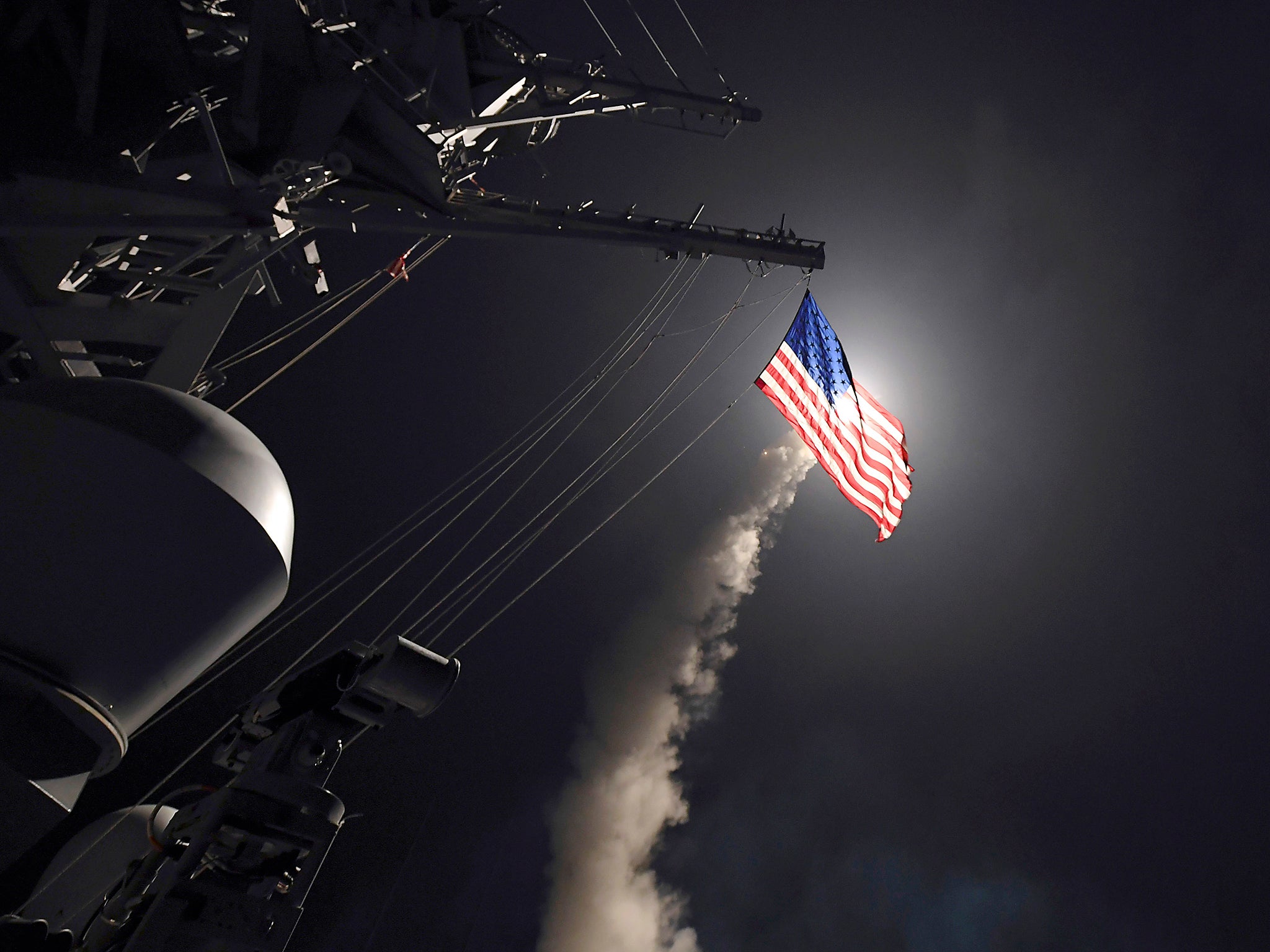US air strikes: Has Donald Trump started armed conflict with Russia over Syrian airbase bombing?
Chatham House expert tells The Independent ‘a broader change in the Syrian conflict seems highly unlikely... But we’re still in the early hours’

America’s cruise missile strikes are a limited action that will not lead to all-out conflict between the US and Russia over Syria, defence and strategic experts have told The Independent.
Despite Donald Trump ordering the strikes after calling the chemical attack in Idlib province an “affront to humanity” that changed his view of Bashar al-Assad, the bigger picture of US strategy probably remains unaltered, said Middle East analyst Tim Eaton.
Mr Eaton, a Middle East research fellow with the Chatham House international affairs think tank, said the missile strikes did not mean the US was now heavily committed to regime change in Syria – something that would massively escalate tension with Vladimir Putin’s Russia, the Assad government’s main backer.
“It’s one thing to punish the use of chemical weapons,” he said. “It’s another to commit to the much greater task of regime change.
“I think we have to see the missile strikes in the context of a targeted and proportionate response to the chemical weapons attack. A broader change in the Syrian conflict seems highly unlikely at the moment.”
He added that while Nikki Haley, US ambassador to the UN may this week have confronted Russia over the “barbarity” of the chemical attack, nothing had changed the “broader constraints” that led her to say a week earlier that the US was no longer focusing on getting Assad out.
Mr Eaton said he did not think the priorities of the administration of Donald Trump – who on the campaign trail promised to “bomb the shit out of Isis” – would shift towards helping Syrian rebel groups overthrow Assad.
“My working assumption,” he said, “is that all the constraints that existed prior to the chemical weapons attack continue to be in place: the American lack of trust in the Syrian opposition forces, because of the fears about the growing influence of Islamist extremists, and combating Isis remaining the overwhelming priority.
“I don’t see that the chemical weapons attack changes any of that.”
Mr Eaton added that by targeting the airbase from which Syrian regime forces allegedly launched the chemical weapons attack, the US cruise missile strikes “seem to be a message that ‘if you use these types of weapons, we will take out your capacity to deliver them’.
“So this seems a response to admonish the Syrian regime and prevent future chemical weapons attacks, not a reconceptualisation of American policy towards the conflict as a whole.”
Vladimir Putin has responded to the missile strikes by condemning them as an “act of aggression” against a sovereign state on a “made-up pretext”.
Russia has also suspended a cooperation deal that allowed US and Russian warplanes to stay out of each other’s way while on combat missions over Syrian airspace.
Mr Eaton, however, said such responses seem far more muted than some had feared.
“The fear was that any token Western intervention would make Russia exacerbate the conflict rather than bring it closer to a resolution,” he explained.
“So far the response seems to be: ‘We as Russia oppose the American actions and we are going to make it more difficult for the US to do these things in the future.’
“Suspending the mechanism for preventing accidental contact between aircraft will have some knock-on effect on bombing raids, so I guess Russia is intimating that any action against the Syrian regime will negatively impact the US-led campaign against Isis.
“But that to me seems markedly different from saying ‘We will respond in kind in some other way inside Syria’.
“And I am sure that behind closed doors, there has been significant anger from the Russians towards the regime for actions that reflect badly on them. It seems logical that might limit Russia’s actions towards the West.”
Mr Eaton added, however, that it was still too early for him to be completely certain of his analysis.
“We are still in the early hours,” he said, “so we don’t know what might come of this.”
Despite such potential uncertainty, the US cruise missile strikes were enthusiastically backed by Peter Felstead, the editor of Jane’s Defence Weekly, who told The Independent: “Though I’m no Trump fan, this is exactly the kind of response that should have met Assad and his forces the first time they used chemical weapons on an innocent population.
“The fact that the US – and UK – didn’t act then was shameful and probably led Assad to believe he could get away with it again.
“Tomahawk cruise missile attacks are a powerful message that US attitudes to that under the Trump administration have changed.
“It also takes the initiative regarding Syria and its future somewhat away from the Russians, as they probably won’t have expected this and are now back to wondering whether their client state – Syria under Assad – can survive over the long term.”
Join our commenting forum
Join thought-provoking conversations, follow other Independent readers and see their replies
0Comments